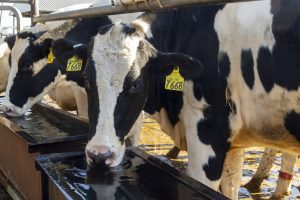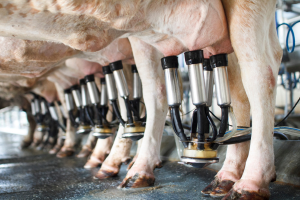Sunday hunting is prohibited on all State Forest property More Info
 In February 2024, an unknown disease affecting dairy cattle causing decreased lactation, low appetite, thickened colostrum-like milk, and other clinical signs was identified in Texas. Herds with these signs have tested positive for Highly Pathogenic Avian Influenza (HPAI) in individual cows and/or the milk. As of April 25, 2024, the United States Department of Agriculture (USDA) has confirmed additional cases in New Mexico, Kansas, Michigan, Idaho, Ohio, South Dakota, North Carolina, and Colorado of H5N1 in dairy cattle.
In February 2024, an unknown disease affecting dairy cattle causing decreased lactation, low appetite, thickened colostrum-like milk, and other clinical signs was identified in Texas. Herds with these signs have tested positive for Highly Pathogenic Avian Influenza (HPAI) in individual cows and/or the milk. As of April 25, 2024, the United States Department of Agriculture (USDA) has confirmed additional cases in New Mexico, Kansas, Michigan, Idaho, Ohio, South Dakota, North Carolina, and Colorado of H5N1 in dairy cattle.
While there have been no reported detections of HPAI in Delaware cattle, the Delaware Department of Agriculture is closely monitoring the situation. The State Veterinarian, Dr. Karen Lopez, DVM, has contacted the large animal veterinarians in Delaware who service cattle operations to ensure they know the clinical signs to look for.
There is no concern about the safety of the commercial milk supply because products are pasteurized before entering the market. A dairy may only send milk from healthy animals for processing; milk from impacted animals is being diverted or destroyed so that it does not enter the human food supply chain. Pasteurization has continually proven to inactivate bacteria and viruses, like influenza, in milk. The sale of raw milk and raw milk products for human consumption in Delaware is not legal, and pasteurization is required for any milk entering interstate commerce for human consumption.
Cattle owners should contact their veterinarians immediately if they notice the following clinical signs of illness:
• Decreased herd-level milk production
• Acute sudden drop in milk production
• Decreased feed consumption/appetite
• Thickened, discolored milk
• Abnormal bowel movements
• Lethargy, fever, and dehydration
 While it is unclear exactly how the virus is being moved, the virus is shed in milk at high concentrations; therefore, anything that comes in contact with unpasteurized milk, spilled milk, etc., may spread the virus, including humans, other animals, vehicles, and other objects or materials. The genetic and epidemiological data in the detections found throughout the country indicate some instances of spread from dairy to dairy and from dairy premises to poultry premises. Both dairy and poultry producers should re-double biosecurity efforts and be vigilant about monitoring for and controlling disease in their herds and flocks.
While it is unclear exactly how the virus is being moved, the virus is shed in milk at high concentrations; therefore, anything that comes in contact with unpasteurized milk, spilled milk, etc., may spread the virus, including humans, other animals, vehicles, and other objects or materials. The genetic and epidemiological data in the detections found throughout the country indicate some instances of spread from dairy to dairy and from dairy premises to poultry premises. Both dairy and poultry producers should re-double biosecurity efforts and be vigilant about monitoring for and controlling disease in their herds and flocks.
Delaware farms are encouraged to continue practicing strict biosecurity. This includes:
• Keep visitors to a minimum. Only allow those caring for your herd to come in contact with the animals. Limit, monitor, and record any movement of people, vehicles, or animals on or off your farm using a log book.
• Wash your hands before and after working with your animals and equipment to reduce the chance of spreading infectious particles. Pay particular attention to mammary health, including good milking practices, such as disinfecting equipment and milking sick cattle separately or last before parlor cleaning.
• Isolate and quarantine new animals for 30 days before introducing them into an established herd.
• Test animals before necessary movements.
• Isolate sick cattle from the herd. Do not move sick or exposed animals off the farm.
• Starlings, songbirds, vultures, and other raptors can be carriers of avian influenza and not show signs of disease. Consider using bird deterrents to keep out of barns, feed, and calving areas.
• Limit non-production animal access to farm areas and implement measures to exclude domestic pets (e.g., cats) and wildlife from buildings.
If cattle within your herd are showing signs of illness, please report these signs immediately to:
• Your local veterinarian,
• Delaware Department of Agriculture’s Poultry and Animal Health Section at (302) 698-4500 or email DEanimalhealth@delaware.gov, or
• USDA Animal and Plant Health Inspection Service (APHIS) at 1-866-536-7593.
Review the following USDA-APHIS Requirements and Recommendations for interstate movement of cattle, biosecurity, milk safety (FDA Contribution), and specific worker safety recommendations (CDC Contribution):
Detection of HPAI in Dairy Herds: Frequently Asked Questions (USDA-APHIS, April 16, 2024)
Influenza and Biosecurity: Not Just for the Birds (USDA-APHIS)
Manage Wildlife to Prevent Avian Influenza (USDA-APHIS)
Improving Biosecurity with Wildlife Management Practices: Reducing Water Access (USDA-APHIS)
Improving Biosecurity with Wildlife Management Practices: Protecting Food Resources (USDA-APHIS)